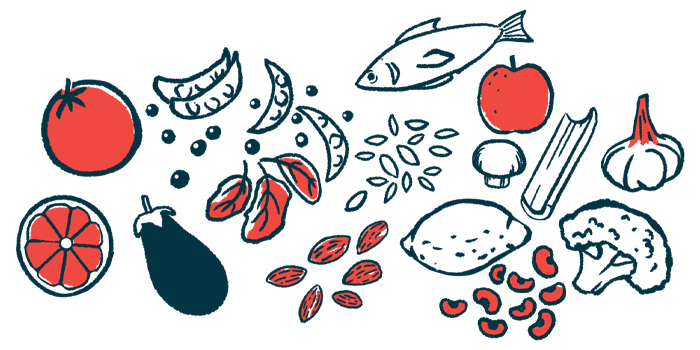Eating more oily fish, raw veggies may help reduce risk of NMOSD
Study used genetic data to examine effect of diet on disease risk

Eating more oily fish and raw vegetables may decrease a person’s risk of developing neuromyelitis optica spectrum disorder (NMOSD), according to a new study of the autoimmune disease that used genetic data.
While most foods reviewed in the study — including beef, bread, cheese, wine, poultry, and also coffee — were not found to be tied to disease risk, the data showed that “a higher consumption of oily fish was associated with a lower risk of” NMOSD, according to researchers.
Also, statistical analyses revealed a link between “high raw vegetable intake and low risk of … NMOSD.” The researchers said that finding “can be explained by the abundant antioxidants found in raw vegetables.”
Overall, the scientists concluded, “our study provides useful implications for the development of … NMOSD prevention strategies.”
The study, “Oily fish and raw vegetable consumption can decrease the risk of AQP4-positive neuromyelitis optica spectrum disorders: a Mendelian-randomization study,” was published in Scientific Reports.
Researchers used genetic variation to examine disease risk
NMOSD is driven by the immune system attacking healthy parts of the brain and spinal cord, causing damage that leads to disease symptoms, which generally affect the eye. In most patients, this autoimmune attack is driven by self-targeting antibodies against a protein called AQP4.
It’s not known exactly what causes NMOSD to develop; a variety of factors from a person’s genetic background to environmental exposures may play a role.
Some research has suggested that differences in diet may affect an individual’s risk of developing the progressive disorder, but so far there’s not enough data to draw firm conclusions.
Now, a team of scientists in China set out to further examine the effect of diet on NMOSD risk using Mendelian randomization. This method uses genetic variation to examine potential cause-and-effect relationships between modifiable exposures and different outcomes, such as the risk of developing a disease.
In this study, the principle behind this method is that certain genetic variations may make people more or less likely to eat certain types of foods. If people who are genetically predisposed to eat more or less of certain foods are also more or less likely to develop NMOSD, this implies that eating the food itself may affect disease risk.
While dietary patterns are complex and vary substantially from person to person and across cultures, these associations can be used in generalized analyses of large populations.
The team combined previously reported associations between genetic variants and the likelihood of eating 26 different types of food with genetic data from 132 NMOSD patients who were positive for anti-AQP4 antibodies and 784 people without the disease. All were of European descent.
The results showed that a higher disposition toward eating two of these food types — specificially, raw vegetables and oily fish — was associated with a statistically significant reduction in the risk of developing NMOSD.
No link to disease risk found for most foods in study
The other 24 food types — including non-oily fish, several types of meats, dried or fresh fruit, coffee, beer or cider, and wine — showed no significant associations with disease risk.
Oily fish such as salmon, herring, and sardines are a good source of certain healthy fats like omega-3 that have anti-inflammatory properties. In addition, raw vegetables are often rich in antioxidants. These beneficial properties may help explain these associations, the team noted.
Still, they stressed that the relationship between diet and disease risk is complex, so future studies are needed to validate these associations and determine the biological underpinnings.
“Further research is needed to determine the exact causal relationship and mechanisms underlying the association between specific food intake and AQP4-positive NMOSD,” the researchers wrote.








